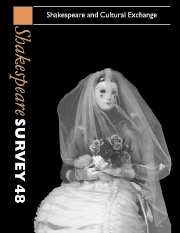Book contents
- Frontmatter
- Shakespeare Translation as Cultural Exchange
- Shakespeare, Theatre Production, and Cultural Politics
- ‘Amphitheaters in the Body’: Playing with Hands on the Shakespearian Stage
- ‘Shakespur and the Jewbill’
- Wilhelm S and Shylock
- Pilgrims of Grace: Henry IV Historicized
- Holy war in Henry V
- Hamlet and the Anxiety of Modern Japan
- Hamlet’s Last Words
- Venetian Culture and the Politics of Othello
- ‘My Music for Nothing’: Musical Negotiations in The Tempest
- The Tempest and Cultural Exchange
- Caliban and Ariel Write Back
- Shakespearian Rates of Exchange in Czechoslovakia 1945–1989
- ‘Are you a Party in this Business?’ Consolidation and Subversion in East German Shakespeare Productions
- The Martyred Knights of Georgian Shakespeariana
- Shakespeare Performances in England, 1993–1994
- Professional Shakespeare Productions in the British Isles, January – December 1993
- 1 Critical Studies
- 2 Shakespeare’s Life, Times, and Stage
- 3 Editions and Textual Studies
- Books Received
- Index
Shakespeare, Theatre Production, and Cultural Politics
Published online by Cambridge University Press: 28 March 2007
- Frontmatter
- Shakespeare Translation as Cultural Exchange
- Shakespeare, Theatre Production, and Cultural Politics
- ‘Amphitheaters in the Body’: Playing with Hands on the Shakespearian Stage
- ‘Shakespur and the Jewbill’
- Wilhelm S and Shylock
- Pilgrims of Grace: Henry IV Historicized
- Holy war in Henry V
- Hamlet and the Anxiety of Modern Japan
- Hamlet’s Last Words
- Venetian Culture and the Politics of Othello
- ‘My Music for Nothing’: Musical Negotiations in The Tempest
- The Tempest and Cultural Exchange
- Caliban and Ariel Write Back
- Shakespearian Rates of Exchange in Czechoslovakia 1945–1989
- ‘Are you a Party in this Business?’ Consolidation and Subversion in East German Shakespeare Productions
- The Martyred Knights of Georgian Shakespeariana
- Shakespeare Performances in England, 1993–1994
- Professional Shakespeare Productions in the British Isles, January – December 1993
- 1 Critical Studies
- 2 Shakespeare’s Life, Times, and Stage
- 3 Editions and Textual Studies
- Books Received
- Index
Summary
Shakespeare’s plays, with their inherently flexible structure and openness of style, positively invite distinctive re-interpretations in performance. They can be cut and amplified, bent this way or that in translation, and, in staging, transported lock, stock, and barrel into the here-and-now or almost any other time and place. Even at their most intense and sustained moments – perhaps especially then – the dialogue can support a wide variety of characterizations: Shylock, Hamlet, Falstaff, Prince Hal, Prospero have all served many purposes, taking shape and spirit from the actors and directors who have laid hands on the very same printed words. Arguments can be readjusted at will, so that a Shakespeare play becomes a director’s opportunity to say whatever he or she wishes under cover of serving its author and taking advantage of his reputation. In a politically conscious world, Shakespeare’s plays can speak politically, in an anxious world psychologically, in a religious world religiously; in a closed world of theatre-making they can become gentle or hectic fantasies of minimal moral or political interest. In most theatres, a director’s conceptual choices are reinforced by a quartet of designers, for set, costumes, light, and sound, whose overwhelming effects thrill an audience and render it submissive to each new interpretation.
Any production can be read as an indication of the culture that supports its theatre, but that message is not always clear. What is far more readily perceived is a distinctive reading, concept, or message created by the production's director, which uses the text in ways which challenge accepted notions of the play's meanings. Representations of something as complex as a culture would be work of a quite different order.
- Type
- Chapter
- Information
- Shakespeare Survey , pp. 13 - 22Publisher: Cambridge University PressPrint publication year: 1996

